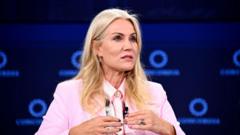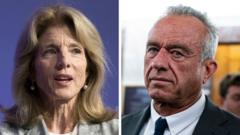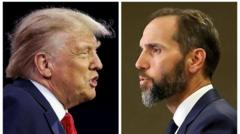Former Danish Prime Minister Helle Thorning-Schmidt expressed alarm over Meta's decision to remove third-party fact-checkers, citing risks to minority groups and potential increases in hate speech. While welcoming some changes, she emphasized the need for oversight amidst concerns about free expression and ties to the Trump administration.
Concerns Rise as Meta Ditches Fact-Checkers, Oversight Board Warns

Concerns Rise as Meta Ditches Fact-Checkers, Oversight Board Warns
Helle Thorning-Schmidt of Meta's oversight board highlights potential dangers from the company's controversial decision to eliminate fact-checking, emphasizing risks to marginalized communities.
In a recent interview, Helle Thorning-Schmidt, co-chair of Meta’s oversight board and former Prime Minister of Denmark, voiced serious concerns regarding Meta's move to eliminate fact-checkers on Facebook and Instagram. Speaking on BBC Radio 4's Today programme, she pointed out the significant impact this decision could have on vulnerable groups, including the LGBTQ+ community and gender rights.
Thorning-Schmidt noted that although Meta plans to introduce a system allowing users to assess the accuracy of posts—similar to "community notes" on another platform—there are "huge problems" with this shift. She warned that lack of proper fact-checking could exacerbate the prevalence of hate speech, which potentially leads to real-world harm. “We will be watching that space very carefully,” she stated.
Meta's CEO, Mark Zuckerberg, described the change as a return to a focus on free expression, blaming third-party fact-checkers for perceived political bias and censorship. However, this strategy has raised questions about the future impact and necessity of the oversight board, especially following the departure of Sir Nick Clegg—who previously initiated the board during his tenure at Meta.
While some praised Meta's new stance on moderation—arguing that it might alleviate issues seen in over-regulation—critics fear that the relaxed policy could diminish the integrity of information shared on the platform. Notable tech journalist Kara Swisher characterized the move as a politically charged decision to align more closely with the anticipated Trump administration, stating it reflects Zuckerberg’s self-interest.
In contrast, free speech advocates praised Meta's efforts to democratize content moderation. Organizations like the US free speech group Fire hailed the announcement, asserting it promotes a freer marketplace of ideas devoid of top-down regulations.
Despite concerns about increased hate speech and misinformation, Zuckerberg acknowledged the inherent risks of this new approach. “We’re going to catch less bad stuff, but we’ll also reduce the number of innocent people’s posts and accounts that we accidentally take down,” he remarked.
As Meta embarks on this new chapter, the company must navigate the delicate balance between promoting free expression and safeguarding its platform from harmful content, all while keeping advertisers' concerns in mind. With the recent upheaval in social media moderation practices, the eyes of both advocates and critics remain firmly fixed on Meta as it shapes its future direction.























